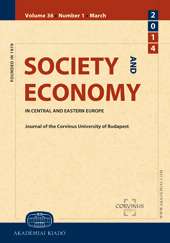The Euro and Central Europe (From Points of View of Monetary Integration Maturity)
The Euro and Central Europe (From Points of View of Monetary Integration Maturity)
Author(s): Tibor PalánkaiSubject(s): Supranational / Global Economy, Economic policy, Economic development, EU-Approach / EU-Accession / EU-Development
Published by: Akadémiai Kiadó
Keywords: Euro and Central Europe; monetary maturity; diverging interests; attitudes; policies; and prospects;
Summary/Abstract: The paper discusses the frameworks and development of the introduction of the Euro in Central Europe, with a focus on pre-entry countries (Czechia, Hungary, Poland, Romania and Croatia). The main elements of monetary integration maturity are the state of real-integration (possibilities of large saving in transaction costs), meeting the criteria of functioning market economy and the single market; macro-economic stability and meeting the Maastricht criteria; and shortcomings of absorption (integration) capacities of the EU. Controversial questions are also discussed, such as requirements concerning inflation, the budget deficit or exchange rate stability. The paper argues that the countries under scrutiny show diverging courses of action and policies, public support is also unclear, and the interests of TNCs and political elites contradict each other. Cultural, legal, security or emotional factors will pay a key role in eventual adoption, and prospects also depend on the solution of the current debt and migration crises.
Journal: Society and Economy. In Central and Eastern Europe ǀ Journal of the Corvinus University of Budapest
- Issue Year: 39/2017
- Issue No: 1
- Page Range: 1-25
- Page Count: 25
- Language: English

